
The Hudson Valley is associated with apples, but in the 19th Century it was associated with grapes. What brought about the change? Prohibition!
Brotherhood Winery in Washingtonville is the oldest continuously operated and licensed winery in the country. Why? Because it was allowed to produce sacramental wine during Prohibition. Benmarl Winery in Marlboro lays claim, however, to being the oldest vineyard, “vineyard” referring to the actual growing of grapes. In the 1870s through the 1920s the Hudson Valley was the source for all grapes—table and wine—for Philadelphia, Boston and New York.
The first apples were grown in 1910, but by 1918, as Yancy Migliore of Whitecliff Vineyard and Winery puts it, “Prohibition put the nail in the coffin for grapes” and apples took over the 12,000 acres previously utilized for the growing of grapes.
Tuthilltown was the first distillery to make whiskey in New York since Prohibition, negotiating the change of laws to allow small scale craft distillation. Now, they are producing their own indigenous apple vodka.
Ever wonder why American beer had the reputation of being bland? During Prohibition people who grew hops—which give beer its taste—pulled them up since there was no legitimate use for them. Beer was then made from rice instead.
Prohibition affected agriculture, economy and cultural tastes.
“Now,” Yancy proclaims, “The Hudson Valley is a hotbed of craft drink production.” Hops are now being grown (See Beer Here. More Coming, page 1) and Dressel Farms is producing hard cider. The days of Prohibition are indeed over!
